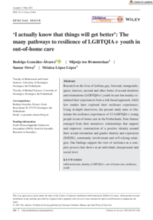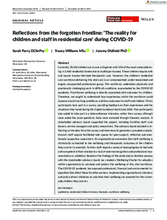Displaying 91 - 100 of 1465
Accurate and reliable data on children living in residential care institutions are essential. However, these children are not identified through household surveys and, as a result, are not typically included in official national statistics on key indicators of child well-being. This includes indicators that comprise global monitoring frameworks, such as the Sustainable Development Goals. To help address this data gap, UNICEF has developed the first-ever comprehensive package to collect data on children living in residential care settings. Claudia Cappa, Senior Adviser for Statistics and Monitoring, Data and Analytics Section, DAPM/UNICEF HQ, explains more.
Using in-depth interviews, the present study aims to illuminate the resilience experiences of 13 LGBTQIA+ young people in out-of-home care in the Netherlands.
Trauma informed care (TIC) emphasizes the importance of professionals maintaining an emotionally regulated state. For this article, the authors interviewed eight staff members in a residential care unit for children and adolescents where TIC had been implemented, about situations wherein they experienced difficulty regulating their own emotions.
The authors of this study sought to understand how experiences within the workforce could improve overall working conditions, and thus outcomes for staff and children.
Drawing on 50 qualitative interviews with children and young people currently or previously living in residential care, as well as a range of social workers and programme staff, this study identifies the highly relational lives of children and young people who cite extensive and close relationships with residential care staff, peers and family.
This is a recording of the National Launch of the UN Global Study on Children Deprived of Liberty in Cambodia, conducted on 22 April 2021.
The conversation of this webinar focused on the root causes of why there are millions of children globally growing outside of families, and discussed some of the proven ways of strengthening families and communities to provide a safe and nurturing environment for the world’s most at risk and vulnerable children.
A systematic review was conducted to examine the effectiveness of interventions and practice models for improving health and psychosocial outcomes of young people in residential care and to identify relevant knowledge gaps.
This paper analyzes the impact of adults’ interactive moves and strategies on children’s participation and agency at dinnertime in two Italian residential care facilities, one of the most widely used alternative care life-context for children and youth coming from vulnerable families.
With millions of children worldwide living in alternative care settings, this article applies the learning from implementation science to advance the sector’s thinking around what needs to be in place to ensure consistently high-quality residential care.




